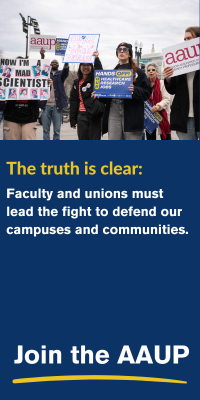- About
- Programs
- Issues
- Academic Freedom
- Political Attacks on Higher Education
- Resources on Collective Bargaining
- Shared Governance
- Campus Protests
- Faculty Compensation
- Racial Justice
- Diversity in Higher Ed
- Financial Crisis
- Privatization and OPMs
- Contingent Faculty Positions
- Tenure
- Workplace Issues
- Gender and Sexuality in Higher Ed
- Targeted Harassment
- Intellectual Property & Copyright
- Civility
- The Family and Medical Leave Act
- Pregnancy in the Academy
- Publications
- Data
- News
- Membership
- Chapters
From the President: Stronger Together
At the AAUP’s biennial meeting in June, delegates voted overwhelmingly to ratify an affiliation agreement with the American Federation of Teachers (AFT). In July, at the AFT’s biennial convention, AFT president Randi Weingarten and I signed the affiliation agreement to thunderous applause and digital fireworks. This column is adapted from remarks I delivered there.
The AFT is a powerhouse, thanks to the strength and work of its 1.7 million members. The organization is founded on the principles of equity and opportunities for everyone. The AFT will never stop fighting for good jobs; high-quality and well-resourced health care; safe, welcoming, high-quality childcare and public education; and higher education as a human right and a public good.
The AAUP and the AFT have had a joint organizing agreement for more than ten years. The joint organizing we have done with individual chapters has been incredibly successful, bringing in thousands of new AAUP/AFT higher education members over the life of the partnership. The AAUP’s academic expertise and the AFT’s power and reach have proved to be a winning combination for organizing academic workers. Our partnership has been successful beyond either organization’s expectations, and this affiliation makes our partnership permanent.
The AAUP’s academic expertise draws on our long history of defending academic freedom and promoting shared governance. These are not just catchphrases to us; they are the principles that have guided the Association since its founding in 1915.
I want to thank the AFT for initiating discussions on a permanent partnership, and I want to thank the members of both negotiating teams. Early in the negotiations, the AAUP Council set forth the following principles to guide any affiliation: preserving the AAUP’s independence and autonomy, increasing our reach across the profession, and maintaining the AAUP’s mission in higher education. The final agreement respects all our guiding principles.
Our affiliation will help us push back against threats to higher education that go beyond the academic world and to democracy itself. Public education has been devastated by decades of disinvestment and underfunding, which have contributed to the explosion of student debt and the crisis of contingency. Many faculty members on contingent appointments are scholars who spent years on their education and training to become experts in their fields, often ending up with lifelong debt. They’ve landed as workers in a gig economy, with many forced to cobble together courses on multiple campuses—as freeway flyers scrambling to make a living and sometimes relying on public assistance to put food on the table. It’s shameful what has become of the profession. The need to fight back harder has never been more crucial.
Legislative interference is another existential threat to higher education. Over the last year or so, state legislators have introduced an unprecedented number of bills to impose government control on what can be taught in the classroom. This isn’t just unfortunate legislation; these bills are truly an attack on democracy.
In a democracy, there is no place for the government to control what is taught or learned in the college classroom. And what is it that the proponents of these bills don’t want students to learn? The true and honest and complicated history of our country. Why don’t they want students to learn that? To preserve a white supremacist society and to maintain power in that white supremacist society. It’s our obligation— as educators, as parents, as people—to fight back against those who would continue to prop up systemic and institutional racism at the expense of truth in education.
Make no mistake, higher education is under attack because those who would like to move the United States toward authoritarianism recognize the power of education. Authoritarian regimes control with disinformation and lies, and education and truth are the ultimate threats to authoritarianism.
Now is the time to strengthen the labor movement and to build a more powerful labor movement in higher education. To save our democracy, we need education and activism. Education will move us toward a multiracial, pluralistic democracy in which we live by bedrock principles of equity and justice, give every person opportunities to thrive, and help and lift up the neediest and most vulnerable. And activism is what gets things done.
President Weingarten already owned at least two copies of the AAUP’s “Redbook,” but when we signed the affiliation agreement I presented her with another to symbolize the AFT’s commitment to AAUP policies and standards and to commemorate our affiliation. This historic agreement builds power, making us stronger together.



